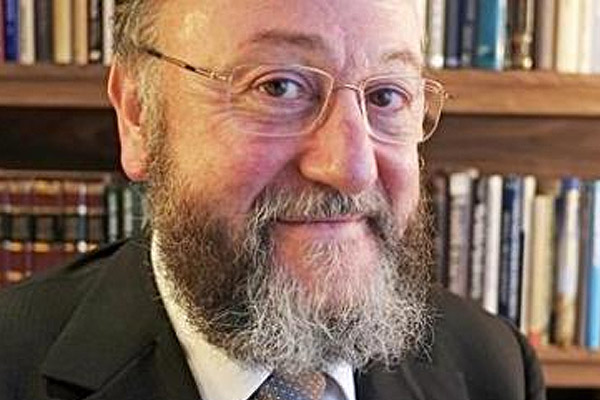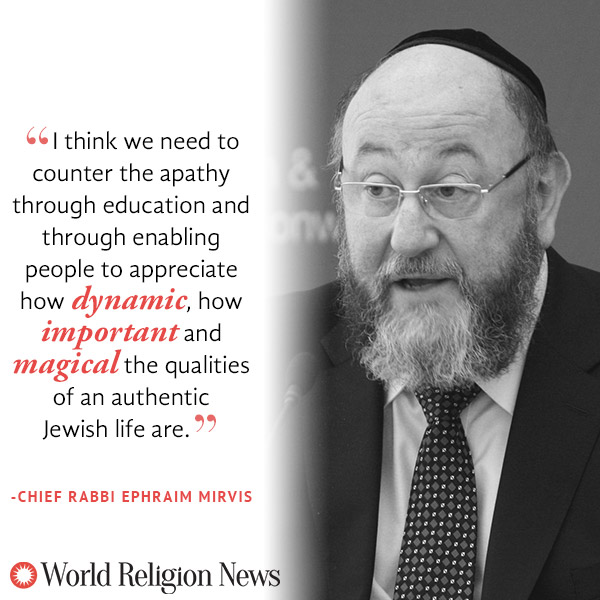
Chief Rabbi Ephraim Mirvis Reflects on his First Year in Office in Interview with Paul Harris
- By WRN Editorial Staff --
- 08 May 2015 --

After his first year as Chief Rabbi, Ephraim Mirvis stresses the importance of Shabbat, his excitement about Centre for Rabbinic Excellence, and identifies his three biggest challenges.
This interview originally appeared on ChiefRabbi.org in 2014. It’s presented as part of our #InTheirOwnWords series.
Rabbi Ephraim Mirvis reflects on his first year in office and tells Paul Harris of his good relations with the Reform Movement and how shuls should welcome gay members.
FRESH from delivering entirely different Yom Kippur sermons in 12 London synagogues and addressing a total of 8,500 congregants over the high holydays, the Chief Rabbi breezed into Manchester on Monday morning. And he brought with him the message that it is important to attend shul on Shabbat by whatever means. Speaking exclusively to the Jewish Telegraph as he launched ShabbatUK, Rabbi Ephraim Mirvis stressed:
“Rabbis have to see people in shul. In the diaspora a connection with shul often means a connection with Judaism and when people walk through the door we’re delighted to see them.”
But did it matter how they actually got there?
“We’re delighted to see everyone who comes into our shul, and as Chief Rabbi I want to see as many Jewish people in shuls as possible and we will always greet them with open arms,” he reiterated.
Did this extend to spouses pushing their spouses in wheelchairs, even where there was no eruv?
“As I said before,” stressed Rabbi Mirvis, “I am delighted to welcome every single Jewish person in our shuls.”
Rabbi Mirvis said that there was “incredible excitement” about ShabbatUK throughout the country. Virtually every community would be doing something “spectacular.”
“Extraordinary is the word I use,” said the Chief Rabbi who is marking a year in office. “Communities have taken up this challenge, and it’s not just communities. It’s youth centres, campuses, home hospitality, in so many communities an incredible challa bake and havdalla ceremonies. “It’s going to be something really special throughout the whole country.”
But Rabbi Mirvis said that equally important was the follow-up to ShabbatUK. “By having a taste of authentic Judaism I have no doubt people will be inspired,” he said.
“They will be ennobled and be connected better to their roots and will have a taste to go for more in their lives ahead of them.”
Rabbi Mirvis also pointed to the Centre for Rabbinic Excellence, which is part of his office and which will encourage follow-up.

“It was something I dreamt of when I became Chief Rabbi and I’ve now been able to do something through this office,” he said. “We’re encouraging rabbis to launch new projects, fresh initiatives, programmes that communities haven’t had before. “It’s available to all communities and the response has been fantastic.”
Rabbi Mirvis said that the CRE was providing expertise and also grants. He said that following extensive visits to communities outside London he had seen “remarkable, not just houses of prayer, but people who make up those communities go the extra mile to ensure that not only services are run but that there is a community centre there.”
Rabbi Mirvis stressed that he enjoys good relations with the leaders of the charedi community and its members.
“Broadly speaking, I think we are getting along well and I think it’s important that there are good connections and good, healthy relationships among all groups within Judaism.”
He added that it was important for him as Chief Rabbi equally to have a good relationship with the spiritual leaders of the Reform movement, but that did not include sharing a platform when it came to matters of religion.
“The status quo is well known, so I have inherited a status quo which is understood and respected,” he stressed. “I’m not intending to deviate in any way from the precedent that has been set beforehand.”
But there is one section of the community with which Rabbi Mirvis will have no truck — the Neturei Karta.
“It is very important for people to know that they do not in any form or fashion represent the Jewish people as a whole,” he declared. “They certainly don’t represent a Torah-true way of life. We know that and I myself am deeply disturbed when I see photos or videos of the type of things that they do.”
Rabbi Mirvis was referring to the public support members of the ultra-Orthodox Neturei Karta have given to Hamas and other enemies of Israel. Rabbi Mirvis said that whilst he had found exciting aspects of the condition of British Jewry today, he had also encountered troubling features since taking office.
“What is of concern to us is the significant level of assimilation, the extent to which there is apathy in some quarters, not only amongst those who are not religiously committed, but for some who are. There isn’t sufficient enthusiasm for what they are doing.”
As a result, he has identified three of the greatest challenges as being apathy, antisemitism and assimilation, adding:
“I think we need to counter the apathy through education and through enabling people to appreciate how dynamic, how important and magical the qualities of an authentic Jewish life are.”
Rabbi Mirvis pointed to a renaissance of Jewish life in Britain which included mushrooming religious, food and communal facilities and Jewish schools.
“Therefore, when I am offering opportunities to learn, people are up for it when they see you care about it and want to deliver something that is good.”
Rabbi Mirvis said that the sometimes prohibitive cost of kosher food was “very much on my radar,” adding:
“It is very important that kosher food should be available at the lowest possible price. “As Chief Rabbi, I would always seek to use my influence to ensure that kosher food would be affordable.”
Rabbi Mirvis supported a Jewish Telegraph suggestion for a central Kashrut authority in Britain.
“This hasn’t been put to me before and I’m not sure there is a real thirst for it,” he observed. But he added: “I think that if it could be achieved to have a universal hechsher, that of course would be amazing. “In north America you have the Va’ad system for one single kashrut authority and I think that’s a wonderful system. “I’m all for rationalisation and the importance of working together, but in terms of regional responsibility the current system seems to be working well.” He went on: “From my point of view, the concept of unity and of working together, making things easier for people, I will always continue to think of how to improve situations.”
The Chief Rabbi was categorical about the community’s stance on gay unions.
“We have a very clear biblical definition of marriage, which is the union of a man and a woman,” he said. But he insisted: “What I would like to stress is that every Jewish person is welcome in our synagogues and all synagogues should be fully inclusive with regard to everybody, whatever they might be, and members of the gay community should know that they are very welcome in our synagogues. It goes without saying. “When the Torah says ‘love your neighbour as yourself’ this is an all-embracing mitzva. “It doesn’t say ‘love your neighbour with the exception of A, B, C or D’. “It means our understanding, our compassion, our consideration should reach out to every single person, and this is how it should be.”
Rabbi Mirvis was adamant that whilst the mindset of society had moved on about euthanasia, Jewish law had not. He added, however:
“I’m purposely not giving a categorical answer on this, as where there are such dilemmas the starting point is that we don’t end life. But if there are specific issues in such tragic circumstances when a person’s life is nearer the end, then people should discuss the issues with their rabbis and their rabbis will advise them what to do.”
Rabbi Mirvis said that the most surprising aspect of being Chief Rabbi had been discovering the “quite enormous” respect with which his office was held within the community and throughout the world. The Chief Rabbi, who next month will embark on a tour of Australia and New Zealand of which he is also Jewish spiritual leader, said that those countries took his role seriously.
A year into his incumbency he says:
“The enormity of the task in hand is one I’m enjoying.”
This interview originally appeared on ChiefRabbi.org in 2014. It’s presented as part of our #InTheirOwnWords series.



















